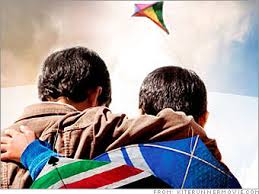Although the back cover did not inspire me much I bought this book for two very rubbish reasons.
Firstly I remember that (although I didn’t actually see it) the film adaption was quite a big deal in its day.
Secondly, in the second hand book store, it was only 50p – hardly a great investment.
I would like to tell you that this is a good book. Certainly the narrative is well written, engaging and the plot will leave you holding your breath. All this said it is a good piece of writing, not a good book. The subject matter is dark, hauntingly disturbing in places, with only glimpses of hope.
The novel follows the story of Amir, set in 1970’s Afghanistan, America and eventually 80’s Afghanistan under Taliban rule. Pakistan does also get a brief mention, as the world watches Afghanistan’s political structure shake and crumble.
I have devoured quite a few books by writers who set there plot in their native cultures or lands. Sri Lanka’s literary geniuses have often taken me too far off lands, and unknown conflicts. I admit, I read them because I like the taste of the exotic; the settings, the flavours, the way characters compose their dialogue in a way that is so different to ours.
To say it is set in Afghanistan, with many of the book’s landmarks recognisable only from red blobs on a news channel map, this book does not feel ‘foreign.’ You don’t wonder at the narrow streets or aromatic flavours than hang in the air. You don’t envision travelling there to one day witness a festival for yourself. Khaled Hosseini writes in such a way, that these are not spectacles to be read in passing – these are familiar, these streets are your home, these characters your family. In doing so you too indulge in the childhood joy and ultimately carry their burdens with them.
When a novel deals with subjects as this; political upheaval, Taliban rule, childhood abuse, and family relationships you expect to have a hero. Someone who is brave, someone who will restore your faith in the world. The book has many likable characters, but none are perfect. The flaws in the characters are those we so often fear to see in ourselves and our friends; cowardice, naivety, betrayals and ruined reputations. In a way, it is the characters flaws that make the book; it makes you question how you would act, if you could forgive, if you would run.
Female characters are few and far between in the plot. Whether down to cultural view points, or simply a way of working them into the story I’ll let you decide; but the women in the novel are all painted as either the Madonna or the fallen angel. There are no babbling middle ground characters here. Though it must be noted that male or female, all are offered redemption in a way.
This book displays love at its best and worst, in all its forms. It celebrates the undying nature of true love between friends; it warns that unrequited love can lead to destruction.
If you want a book to lazily flip through, then pass this book by. It will make you work, it will force you to answer questions and acknowledge that which we in the safety of the West are happy to ignore.


